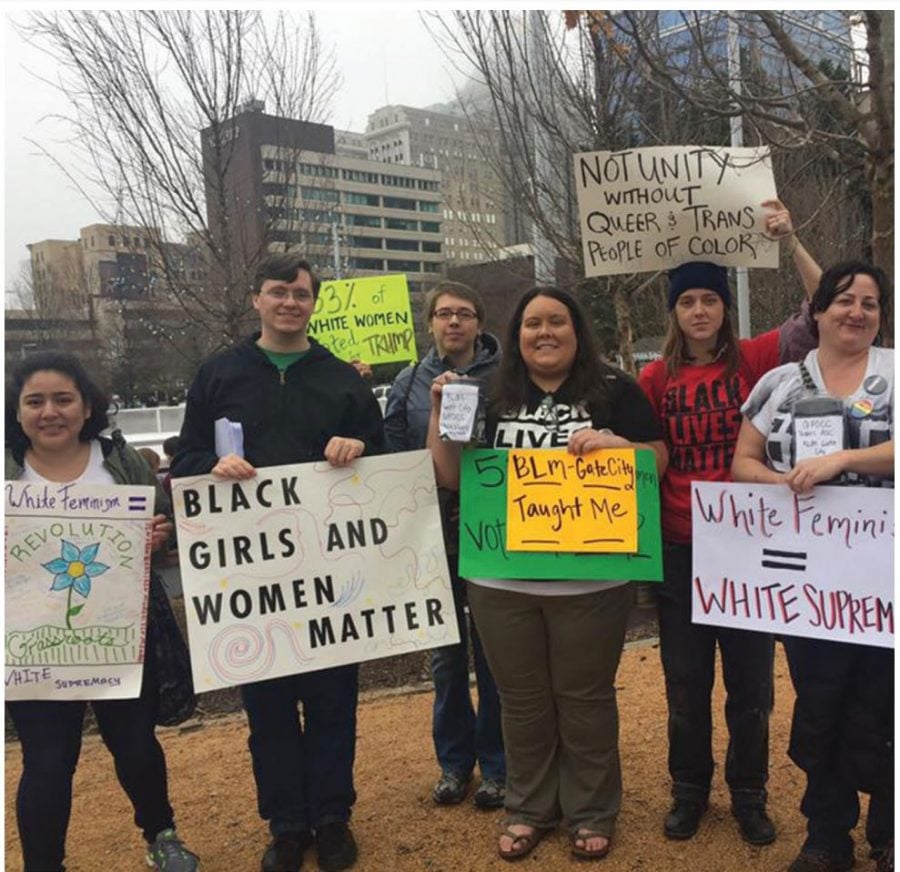Women’s strike success in GSO, nationally
Supporters and allies of the Black Lives Matter movement collect money for queer and trans women of color during the “A Day Without Women” protest that took place on Wednesday, March 8, in Greensboro, North Carolina. // Photo courtesy of Valeria Sosa
The streets of New York flood with women and femmes. Businesses shut down for the day. Schools closed in places like Maryland and North Carolina.
It is March 8, International Women’s Day, and women are taking part in “A Day Without a Woman” strike.
“I think it’s always an important day, and I wish that we institutionally found time to really mark it in some important way,” said Associate Professor of Philosophy Lisa McLeod. “We haven’t historically.”
The strike, inspired by the “Day Without Immigrants” strike on Feb. 16, was meant to show how the nation would suffer if a large portion of the workforce suddenly decided to not work for a day. It was also a protest of Donald Trump’s administration and policies so far.
“Because of the systematic dismantling of the labor movement for the last 50 years, strikes aren’t going to be successful quite yet because we just don’t have the union membership or the capacity to sustain them in an effective way,” said senior Olivia Chalkley.
“(But) because the state has a monopoly on violence and all these other forms of oppression, I think withholding our labor is one of the only ways that we can impact the administration.”
Chalkley helped organize a march on that day in downtown Greensboro.
“Definitely not as big of a turnout as I’d hoped for, but considering we’d planned it with such short notice, it was alright,” said Chalkley.
After the backlash the Women’s March on Washington received for lack of inclusivity, these marches around the country were careful to center marginalized voices.
“I especially think the rally downtown was organized in a good way,” said senior Ellie Weiner. “It was organized by the International Socialist Organization in Greensboro, and they were centering women of color and trans women. That’s the best way to do that kind of thing.”
Not every woman was able to take the day off work, but many celebrated the day in their own ways.
“I wanted to spend the morning reading work by women and femmes, particularly my students,” said Assistant Professor of English and Creative Writing Mylène Dressler. “I got to spend time in the morning in memoir workshop with a group of students, all of whom identify with the pronoun ‘she.’
“I did not make any assumptions about the politics of the room. What I wanted to do was create a beautiful and creative space.”
The Guilford community also celebrated Women’s History Month, which takes place in March, in other ways. On March 13, Hispanos Unidos de Guilford and the Black Student Union hosted a Womyn’s Herstory Month banquet in the Community Center.
“It is very important because, on a daily basis, it seems like only white women are making a difference in the world, which that is not the case,” said sophomore Jeniffer Gonzalez-Reyes, who spoke at the banquet, in an email interview. “By centering the importance on women of color it also creates a sense of hope/motivation for other students of color including myself.”
At the banquet, Gonzalez-Reyes performed her monologue from “Womyn with a Y” on Feb. 10.
“I knew a lot of people would feel uncomfortable, but the monologue speaks for itself,” said Gonzalez-Reyes. “The monologue speaks about a womyn’s story that most people never hear about. It was relevant to the banquet because it was focused on unknown stories of women and just beginning the dialogue about these stories.”
Although strikes and banquets are unlikely to impact the current administration’s policies, there are points to hosting such events, such as letting people know they are not isolated, building communities and communicating that something is wrong.
“People are going to have to continue discussing what is the point of going out and demonstrating and protesting, and that is always an interesting conversation,” said McLeod.









